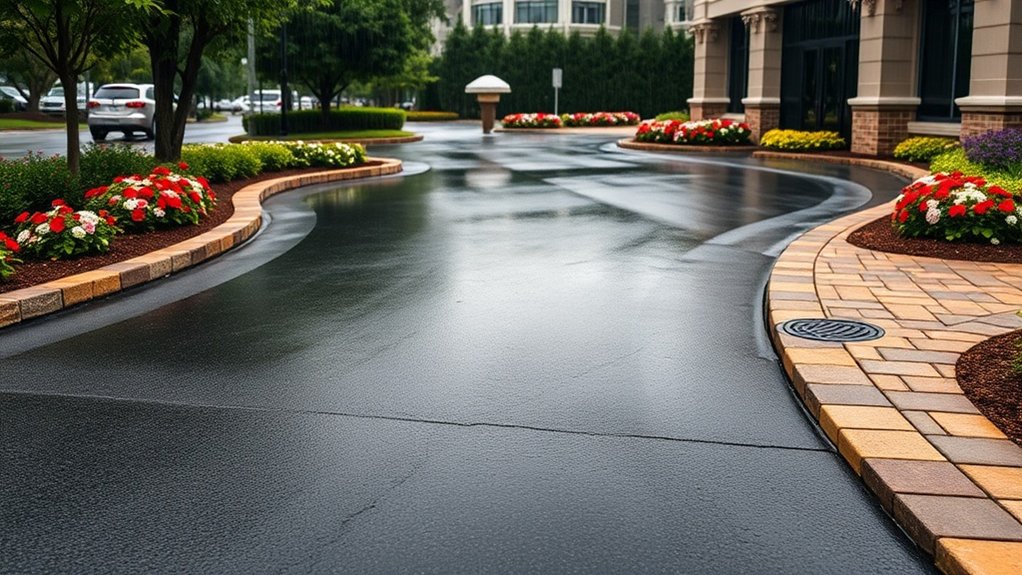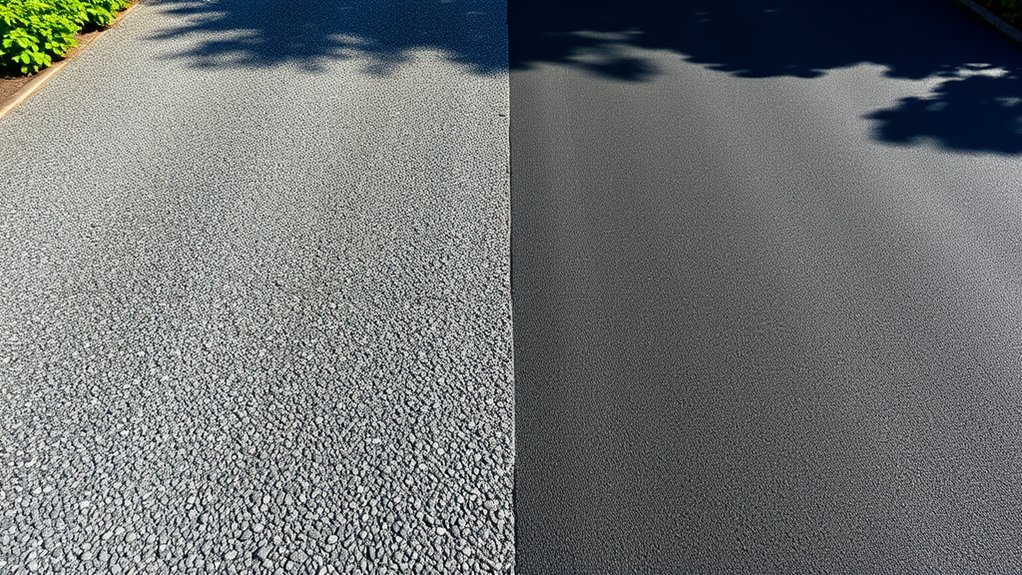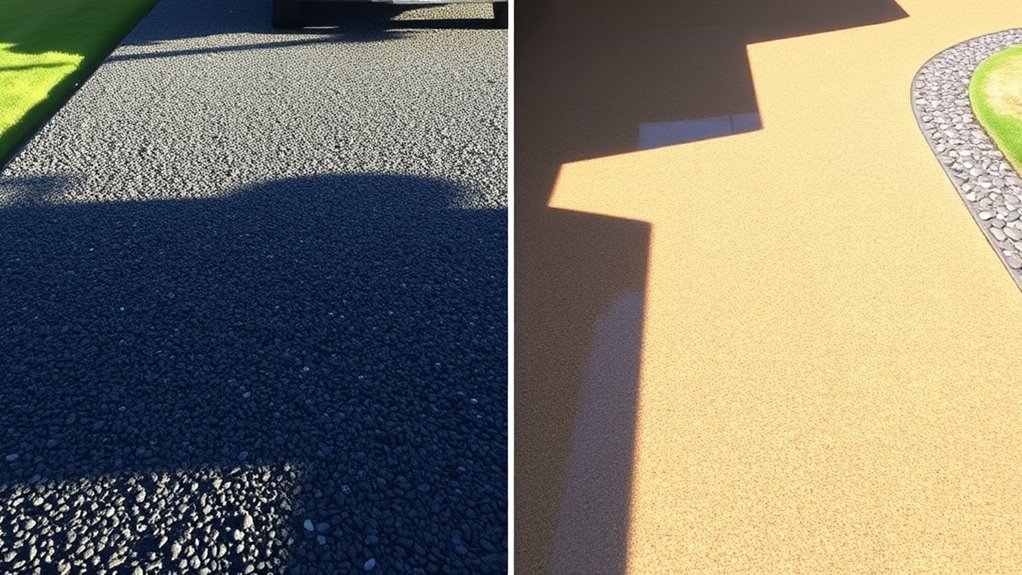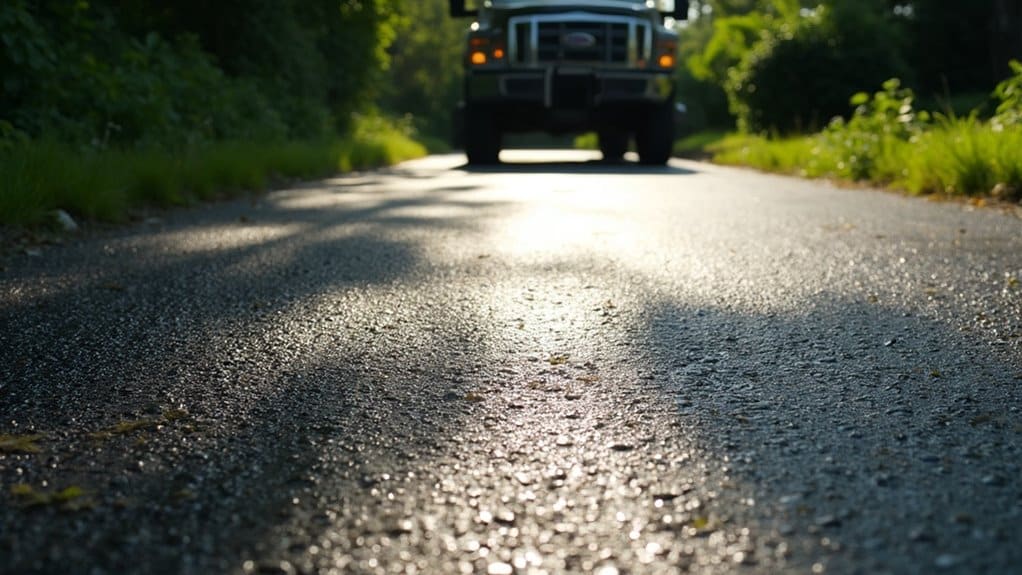When choosing driveway materials for commercial properties in wet climates, consider options like permeable pavers, which allow water drainage and reduce runoff. Asphalt is cost-effective and provides good skid resistance, while concrete is durable enough to handle heavy loads. If you’re on a tighter budget, gravel can be a flexible choice, though it may need regular maintenance. Each material has its advantages and disadvantages, so it’s crucial to understand how they perform in wet conditions and temperature changes. Take these factors into account to make an informed decision.
Table of Contents
ToggleKey Takeaways
- Permeable Pavers are excellent for managing water runoff in wet climates. They allow rainwater to drain through, which helps recharge groundwater and reduces erosion—perfect for commercial properties that see heavy rainfall.
- Asphalt Driveways are a practical choice due to their high skid resistance and flexibility. They stand up well to heavy traffic and are cost-effective, making them suitable for busy commercial sites in wet conditions.
- Concrete Driveways are known for their strength but require proper drainage and regular upkeep to avoid damage from the weather. Without good drainage, they can crack in wet conditions.
- Resin-Bound Driveways offer great drainage and low maintenance, making them an appealing option for businesses in areas prone to rain. They provide a durable surface that can handle heavy foot and vehicle traffic.
- Sustainable Drainage Systems (SuDS) can be integrated with any of these materials to enhance water management. They help mitigate flooding risks, making them a smart choice for commercial developments in wet areas.
Understanding the Challenges of Wet Climates
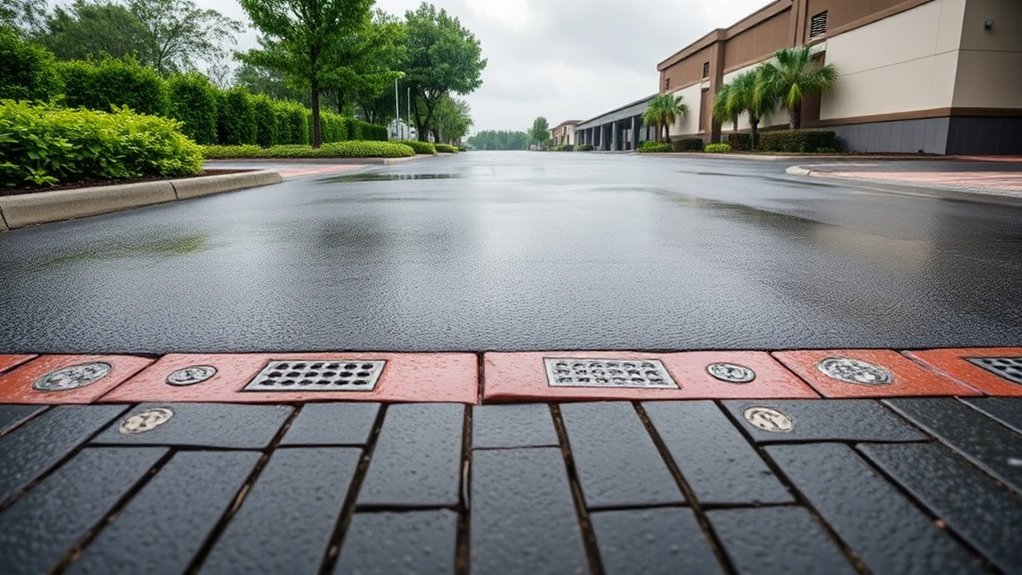
When designing driveways in wet climates, it’s crucial to tackle specific challenges that affect material choice and long-term durability.
Water penetration is a major issue, as it can seep into asphalt and concrete, causing structural damage over time. Moreover, moisture can lead to standing water, which weakens the bond between layers and contributes to erosion and pothole formation. In concrete driveways, excess moisture can erode the cement mix beneath the surface, further compromising their integrity. To address these problems, it’s vital to choose materials that resist moisture intrusion. Additionally, considering permeable paving solutions can effectively enhance water drainage and minimize the risk of standing water on driveways. Implementing Sustainable Drainage Systems (SuDS) can further improve water management and reduce flooding risks. Applying sealants can also effectively prevent water penetration, protecting the driveway surface and extending its lifespan.
Advantages of Asphalt Driveways
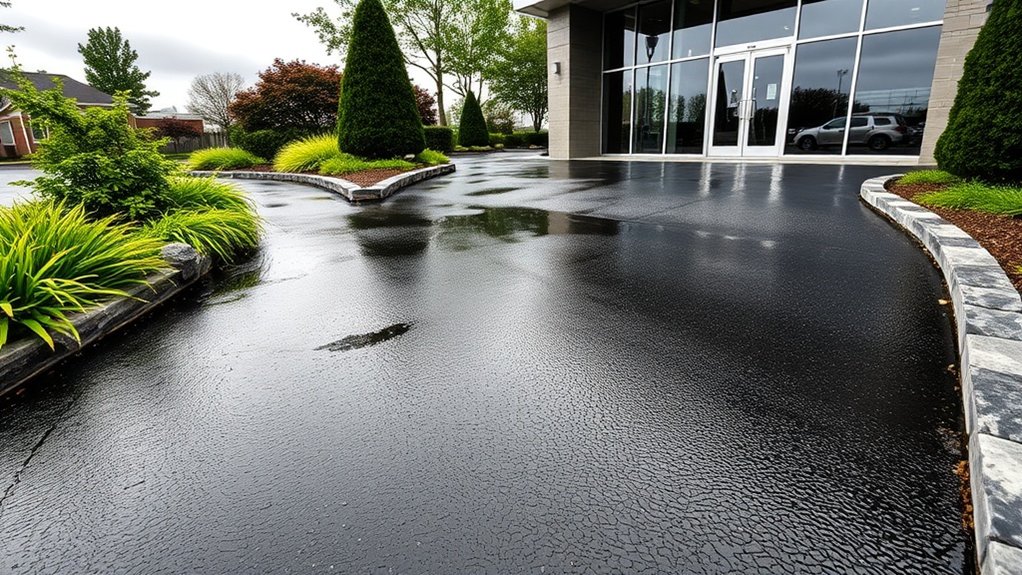
Choosing asphalt for your driveway comes with several advantages, particularly in damp climates where durability is crucial. Asphalt can handle significant temperature changes and heavy usage without losing its structural integrity. Its flexibility helps reduce the risk of cracking, while a smooth surface prevents potholes and other forms of deterioration. Additionally, well-maintained asphalt driveways can last several decades, providing long-lasting performance. Tarmac driveways offer exceptional durability and strength, which is especially beneficial in wet climates. Safety is another key benefit; asphalt provides high skid resistance, improving driving comfort during wet or icy weather. Moreover, it’s often more affordable to install than other materials and requires minimal maintenance, making it a cost-effective option. The installation process is quick, causing less disruption to your routine, and the fact that asphalt is recyclable supports environmental sustainability.
Durability of Concrete Driveways
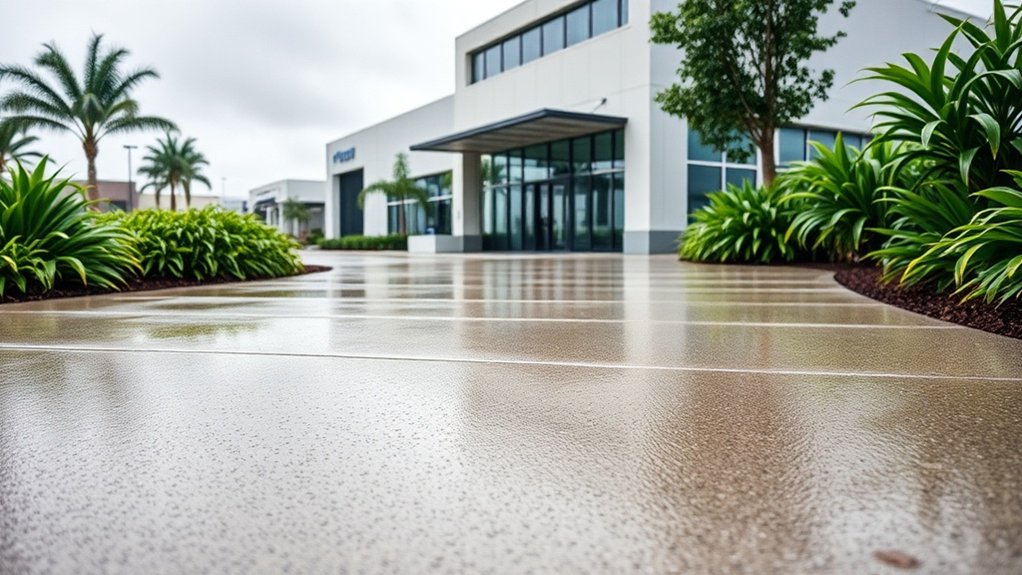
When it comes to concrete driveways, their impressive compressive strength offers a robust base for heavy vehicles. However, ongoing maintenance is crucial; regularly sealing and addressing repairs quickly can prevent weather damage and prolong the life of your driveway. Proper installation quality significantly affects the lifespan of a concrete driveway, ensuring that it can last for decades with the right care. Additionally, effective drainage is essential to maintain the structural integrity of the driveway and prevent excessive water accumulation.
Compressive Strength Advantages
Compressive strength is crucial for the durability of concrete driveways, particularly in wet climates. A high compressive strength, generally above 28 MPa (4,000 PSI), improves durability by resisting cracking caused by freeze-thaw cycles and thermal expansion.
A dense concrete mix limits water penetration, reducing the risk of freeze-related damage and surface scaling.
It’s important to maintain the right water-to-cement ratio, ideally around 0.45; too much water can increase porosity and weaken compressive strength. Proper curing techniques ensure full hydration, enhancing durability further.
In commercial settings, the strength ratings influence the mix design and the use of additives, ensuring long-lasting performance.
Long-Term Maintenance Considerations
Maintaining concrete driveways in wet climates can be straightforward with regular care.
Establish a maintenance schedule that includes sealing every 2 to 3 years to protect against moisture and UV damage.
Clean the driveway regularly with a mild detergent and pressure wash it to prevent dirt and mould build-up.
Address any cracks promptly to stop water from seeping in and causing further damage.
Limit the use of de-icing chemicals to reduce the risk of spalling.
After severe weather, get a professional inspection to catch potential issues early.
Proper installation and design are crucial, ensuring good drainage and boosting the driveway’s resilience against the elements.
Benefits of Permeable Pavers
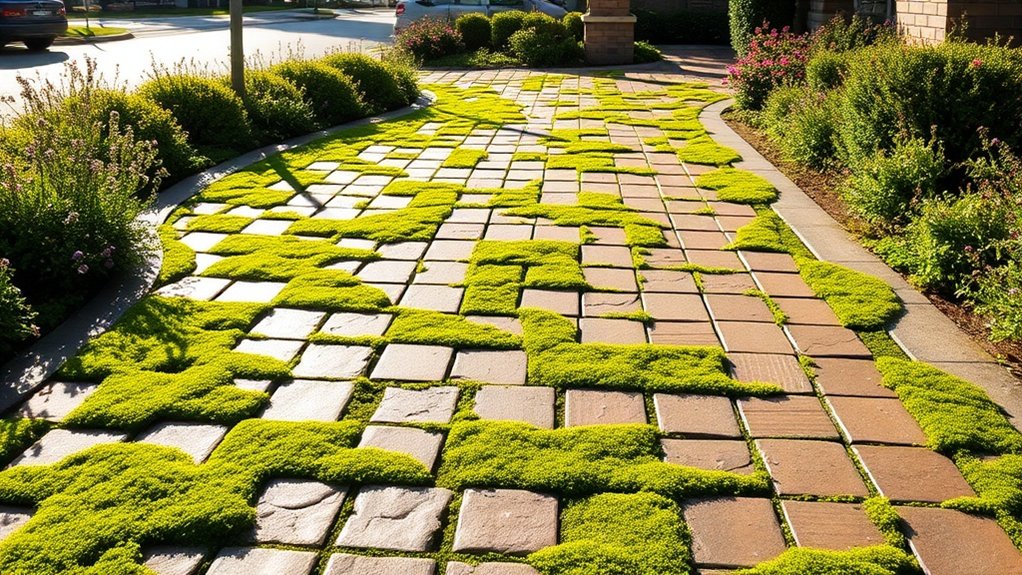
When choosing driveway materials for wet climates, permeable pavers have clear benefits.
They allow water to drain through, reducing surface runoff and the risk of flooding, while also promoting environmental sustainability.
Furthermore, these pavers can withstand heavy traffic, making them suitable for both residential and commercial use.
Water Infiltration Benefits
Permeable pavers provide excellent benefits for managing water infiltration, particularly in areas with heavy rainfall. Their ability to allow water to pass through reduces surface runoff, which helps prevent flooding.
By promoting groundwater recharge, these pavers support local wildlife and contribute to effective water management over time.
Moreover, permeable pavers help filter out pollutants, leading to cleaner water and decreasing reliance on expensive water treatment systems. They also minimise water pooling, which results in safer driving conditions and improves the overall appearance of an area.
This combination of advantages not only tackles immediate drainage issues but also supports a more sustainable approach to managing stormwater, ultimately saving on infrastructure costs and boosting property values.
Environmental Sustainability Features
As urban areas face the challenges of managing stormwater and environmental degradation, permeable pavers offer an effective solution that promotes sustainability.
These materials provide notable ecological advantages, especially in wet climates. Here are some key benefits:
- Sustainable drainage significantly reduces stormwater runoff, helping to prevent flooding and erosion.
- Natural filtration enhances water quality, safeguarding local ecosystems.
- Cooler surface temperatures help counteract the urban heat island effect, which can lower energy use.
- Many durable permeable pavers are made from recycled materials, supporting environmental responsibility.
These features not only tackle environmental issues but also foster long-term sustainability, making permeable pavers a wise choice for your commercial property’s driveway.
Traffic Support Capabilities
Driveway performance depends on its ability to bear traffic loads while managing water drainage effectively.
Permeable pavers, such as permeable interlocking concrete pavers (PICP), are designed to support both foot and vehicle traffic, remaining structurally sound even when saturated. Important design factors, like sufficient subbase depth, ensure they can withstand wet or clay-heavy soils.
Research shows these systems can manage significant traffic loads without losing functionality, even in wet conditions. With drainage rates of up to 38.5 inches per square foot per hour, permeable pavers help prevent surface water pooling and reduce the risk of hydroplaning.
Their capacity to maintain water infiltration under load is crucial for safety and lowers maintenance requirements, making them a top choice for commercial properties in damp climates.
Gravel Driveways: Pros and Cons
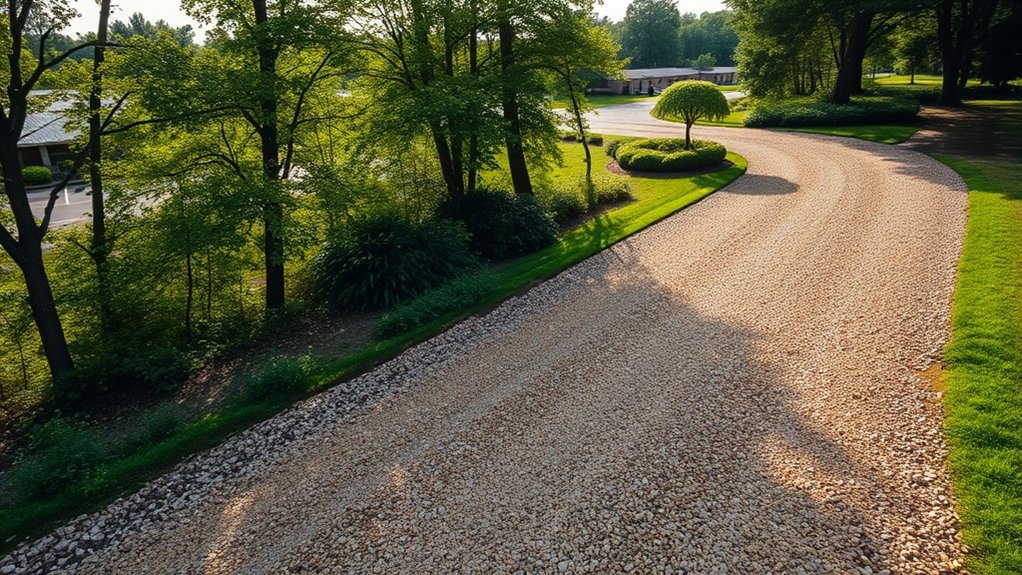
When considering driveway options for wet climates, gravel driveways come with both benefits and drawbacks. Here are some important points to consider:
- Cost-Effectiveness: Gravel is generally cheaper to install and requires less maintenance, making it a budget-friendly option.
- Quick Installation: Gravel can be laid quickly on different slopes and doesn’t need time to cure, which is ideal if you need a speedy solution.
- Good Drainage: The porous nature of gravel allows water to drain away efficiently, helping to prevent puddles and erosion.
- Durability Issues: Although gravel is less likely to crack, it can develop ruts under heavy use, meaning you might need to top it up occasionally.
Weighing these pros and cons can help you decide if a gravel driveway is the right fit for your property in a wet climate.
Exploring Resin-Bound Driveways
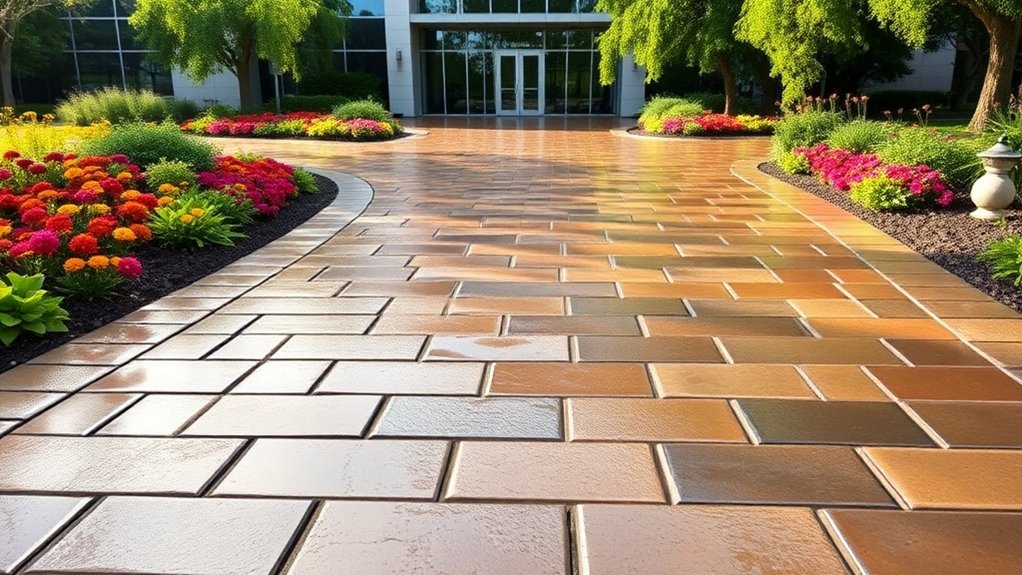
When choosing a driveway for wet climates, resin-bound driveways are a top option due to their excellent drainage capabilities, allowing rainwater to filter through easily.
They also offer various aesthetic choices, so you can customise the appearance to suit your home.
In the long run, they provide cost efficiency, striking a balance between initial investment and low maintenance.
Enhanced Drainage Properties
Resin-bound driveways are an effective solution for managing water runoff due to their unique porous structure, which allows rainwater to flow through the surface and into the soil below.
This design significantly improves drainage and offers several benefits:
- SUDS Compliance: They may not require planning permission, making installation easier.
- High Permeability: Capable of absorbing up to 850 litres of water per m² per minute, helping to reduce surface runoff.
- Lower Flooding Risk: Minimises pooling and decreases the chances of flash floods.
- Sustainable Management: Aids in recharging local groundwater, promoting a healthier urban environment.
Aesthetic Customization Options
Resin-bound driveways provide various aesthetic options to enhance your property’s visual appeal.
With a wide choice of colours, you can pick shades that match your branding or architectural style. Unique patterns, such as herringbone or checkerboard, can create a distinctive look.
Different aggregates offer various textures, and you can even embed custom logos or symbols for branding.
Bordering options further improve the appearance by introducing contrasting colours.
This design flexibility not only boosts aesthetics but also ensures your driveway complements the overall property, creating a professional and welcoming atmosphere for visitors and clients.
Long-Term Cost Efficiency
Cost efficiency is a key consideration when choosing driveway materials, particularly in wet climates where durability and maintenance are crucial.
When evaluating resin-bound driveways, it’s important to conduct a life cycle analysis to appreciate the long-term advantages, such as:
- Reduced maintenance costs thanks to minimal upkeep.
- A lifespan of 15–25 years, which boosts your investment returns.
- Permeability that lessens the need for extra drainage solutions.
- Weather resistance that cuts down on repair frequency.
While the initial installation may be pricier, the long-term savings and low maintenance make resin-bound driveways a cost-effective option.
Investing wisely ensures your commercial property remains efficient and appealing for years to come.
The Role of Recycled and Sustainable Materials
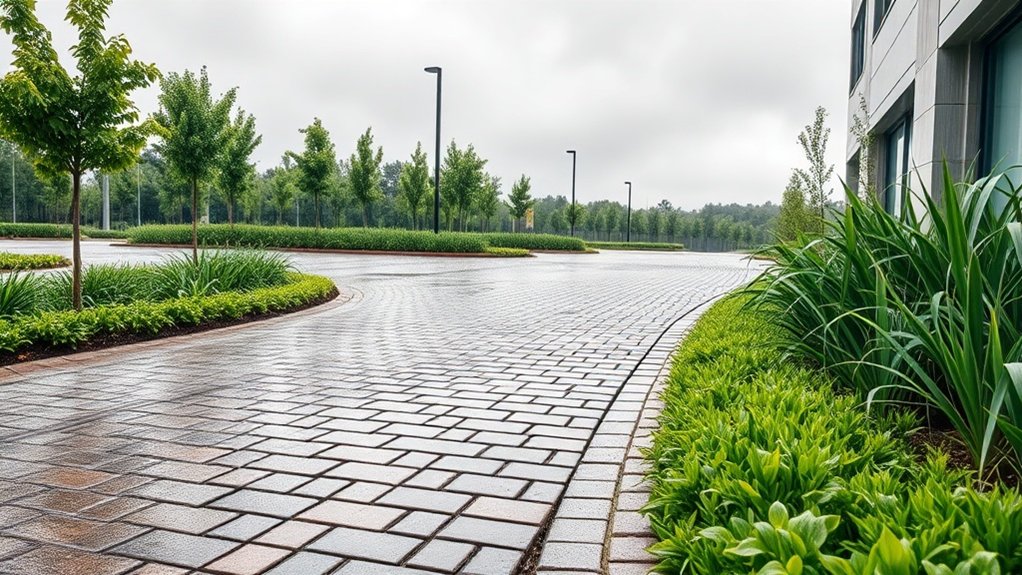
When considering driveway options for wet climates, using recycled and sustainable materials is crucial due to their environmental and practical advantages.
For instance, recycled asphalt and concrete not only cut down landfill waste but also help save on initial costs, making them budget-friendly options.
Permeable and grass pavers improve stormwater management by allowing natural drainage, promoting sustainable practices.
These materials are durable and resistant to water damage and heavy use. Their versatility suits various settings, from rural driveways to commercial parking areas.
Maintenance Requirements for Driveway Materials
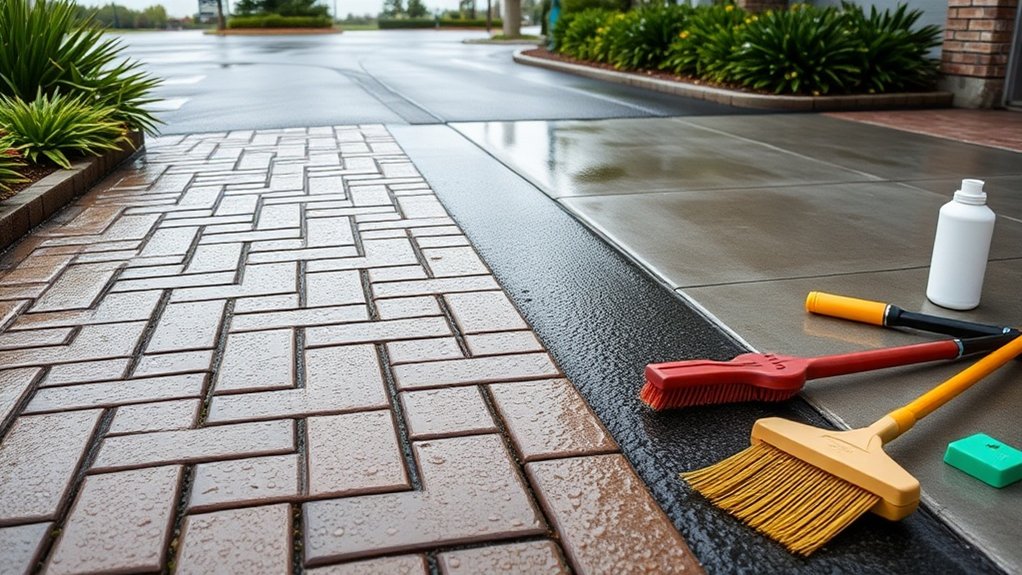
When choosing driveway materials for wet climates, it’s essential to understand the maintenance requirements to ensure longevity and performance. Proper upkeep protects your investment from the elements.
Here are key maintenance tasks to consider:
- Asphalt: Regular cleaning, sealcoating, and crack sealing are crucial. Ensure proper drainage to prevent water damage.
- Gravel: Regularly level and replenish gravel to avoid ruts, and keep debris clear for better traction.
- Pavers: Maintain their appearance by cleaning the surface, preventing weeds, and ensuring edge support.
- Seasonal Upkeep: Carry out inspections and maintenance tasks in line with seasonal changes to effectively address wear and tear.
Cost Considerations for Commercial Driveways
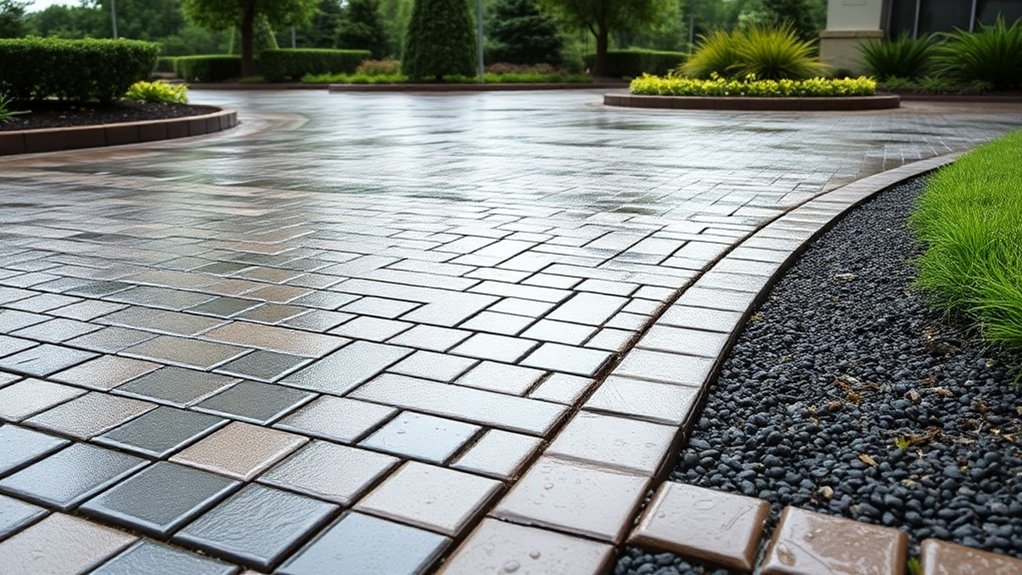
Understanding the maintenance needs of driveway materials is crucial for assessing costs associated with commercial driveways. A thorough cost analysis is essential.
Asphalt, costing £35–£85 per sq m, has lower initial costs but may need regular sealing. Concrete, at £45–£110 per sq m, is pricier but offers better durability in wet climates with adequate drainage.
Porous materials provide effective drainage solutions, though they come with higher upfront costs.
Don’t forget to consider labour and installation expenses, which can increase significantly due to site preparation and drainage systems, especially in cold or wet areas.
Ultimately, choosing the right material based on local conditions will help prevent long-term repair and replacement costs, making it a wise investment for your commercial property.
Aesthetic Options for Driveway Design
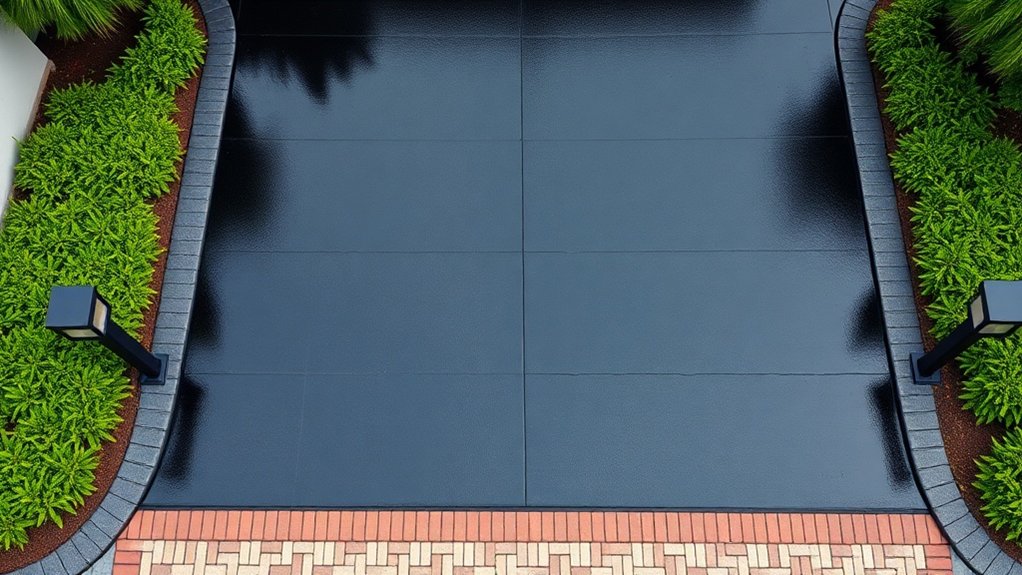
Selecting the right aesthetic options for your driveway can significantly enhance the appeal of your commercial property while ensuring it remains functional, particularly in wet weather.
Here are some effective choices:
- Decorative Concrete Finishes: Look into stamped, exposed aggregate, or textured concrete for versatile designs that stand out.
- Paver Options: Consider using concrete, brick, or natural stone pavers to create unique patterns that add visual interest.
- Integration with Landscaping: Combine hardscaping with greenery to soften the overall look and boost curb appeal.
- Colour and Texture Trends: Opt for darker shades and multi-tone finishes to create striking contrasts while also addressing practical concerns in wet conditions.
These selections will ensure your driveway is both attractive and practical, meeting the challenges posed by rainy weather.
Safety Features in Driveway Materials
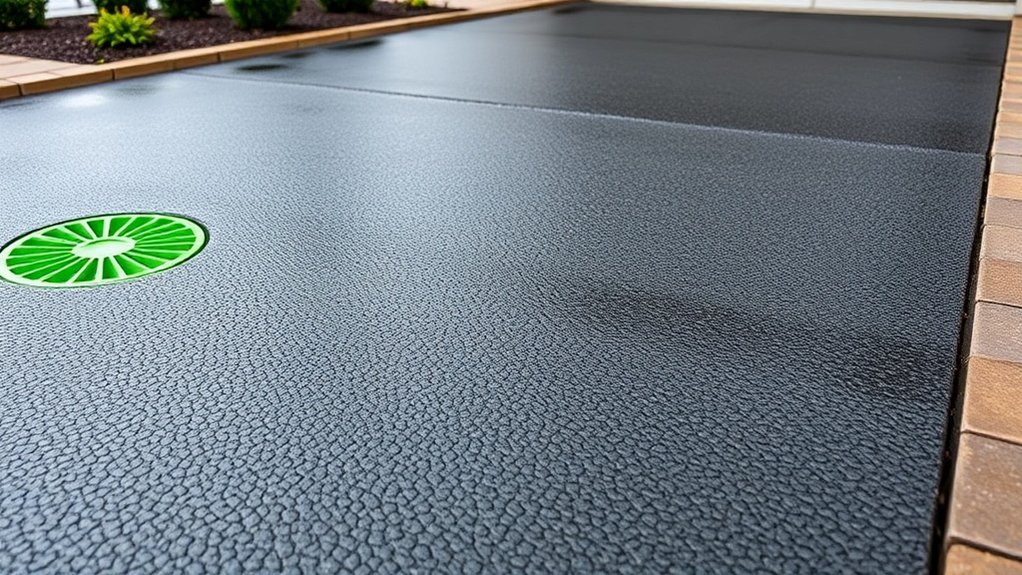
Choosing driveway materials with safety features is crucial for functionality and protection, especially in wet climates. To meet safety standards, opt for materials that boost slip resistance and reduce the risk of accidents. Effective drainage systems, textured anti-slip coatings, and permeable pavers can help minimise puddles.
| Material Type | Safety Features |
|---|---|
| Textured Concrete | Offers high slip resistance and durability |
| Permeable Pavers | Reduces water runoff and improves traction |
| Gravel Overlays | Enhances grip and aids drainage |
These options not only enhance safety but also contribute to the overall aesthetic of your driveway.
Making the Right Choice for Your Property
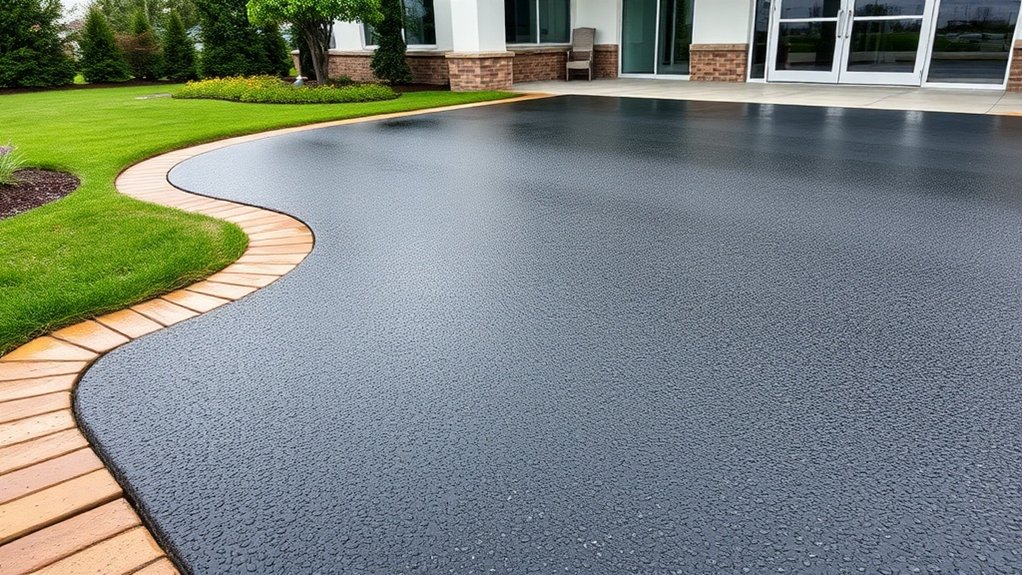
When choosing the right driveway materials for your property, it’s important to consider several factors that affect both performance and longevity.
Focus on drainage solutions, suitability for your climate, and your budget. Here are some key points to think about:
- Durability: Opt for materials such as asphalt or permeable block paving that can handle wet weather.
- Maintenance: Evaluate how much upkeep each material requires; for instance, gravel may need regular topping up.
- Cost: Weigh the initial costs against long-term maintenance to determine the most economical choice.
- Environmental Impact: Look into eco-friendly options like permeable block paving or recycled materials.
Frequently Asked Questions
How Do Different Driveway Materials Affect Property Value?
Different driveway materials can significantly influence property value by improving aesthetics and ensuring durability. For instance, a well-maintained block paving driveway not only enhances curb appeal but also attracts potential buyers. In contrast, a cracked, uneven gravel driveway may deter interest. Quality materials tend to require less upkeep, which can further boost your property’s market value and desirability.
What Is the Best Driveway Material for Heavy Truck Traffic?
For heavy truck traffic, permeable pavers are an excellent choice. They offer the durability of asphalt combined with the strength of concrete, making them capable of supporting substantial loads with minimal upkeep. Think of them as a robust bridge, designed to handle constant heavy movement without any issues.
Can I Install Permeable Pavers Myself?
Yes, you can install permeable pavers yourself with the right planning and preparation. Make sure you understand the DIY installation process, and be prepared for regular maintenance to ensure they work effectively over time. For example, it’s important to keep the joints clear of debris to allow water to drain properly.
How Do Temperature Fluctuations Impact Driveway Longevity?
Temperature extremes and freeze-thaw cycles significantly affect the longevity of driveways. These fluctuations cause materials to expand and contract, which can lead to cracking and structural damage. For example, during a cold snap, moisture in the concrete can freeze, expand, and create cracks, while in warmer weather, the material may shrink. To enhance durability, it’s advisable to choose flexible materials and ensure proper drainage to prevent water accumulation. This can help mitigate the adverse effects of temperature changes.
Are There Eco-Friendly Options That Require Less Maintenance?
Consider your driveway as a vital part of your home. Eco-friendly materials like permeable pavers and resin-bound options are excellent choices. They require little maintenance while offering environmental benefits. With these options, you can expect long-lasting durability without needing to constantly fuss over upkeep.
Conclusion
In summary, choosing the right driveway material for your commercial property in a wet climate is crucial for durability and safety. Whether you choose the robust nature of asphalt, the strength of concrete, or the environmentally friendly option of permeable pavers, each has its advantages. Avoid poor drainage that could lead to a flooded property—invest in materials that will last, much like a reliable British classic car.
Beneath the surface of tarmac and asphalt driveways lies a world of differences; discover which option suits your needs best.
Choosing between a tarmac and resin driveway can be challenging; discover the key factors that could influence your decision.
Tarmac driveways can support impressive weights, but understanding the key factors will help you determine just how much yours can Read more

